“It was a reaction to a life of being bullied and also a celebration of fun. A lot of the metal world didn’t understand that”: How Limp Bizkit’s Fred Durst became nu metal’s biggest star – and lived to tell the tale
With his red cap and hip hop swagger, Fred Durst was the biggest and most divisive star of the nu metal era. But that’s only half the story
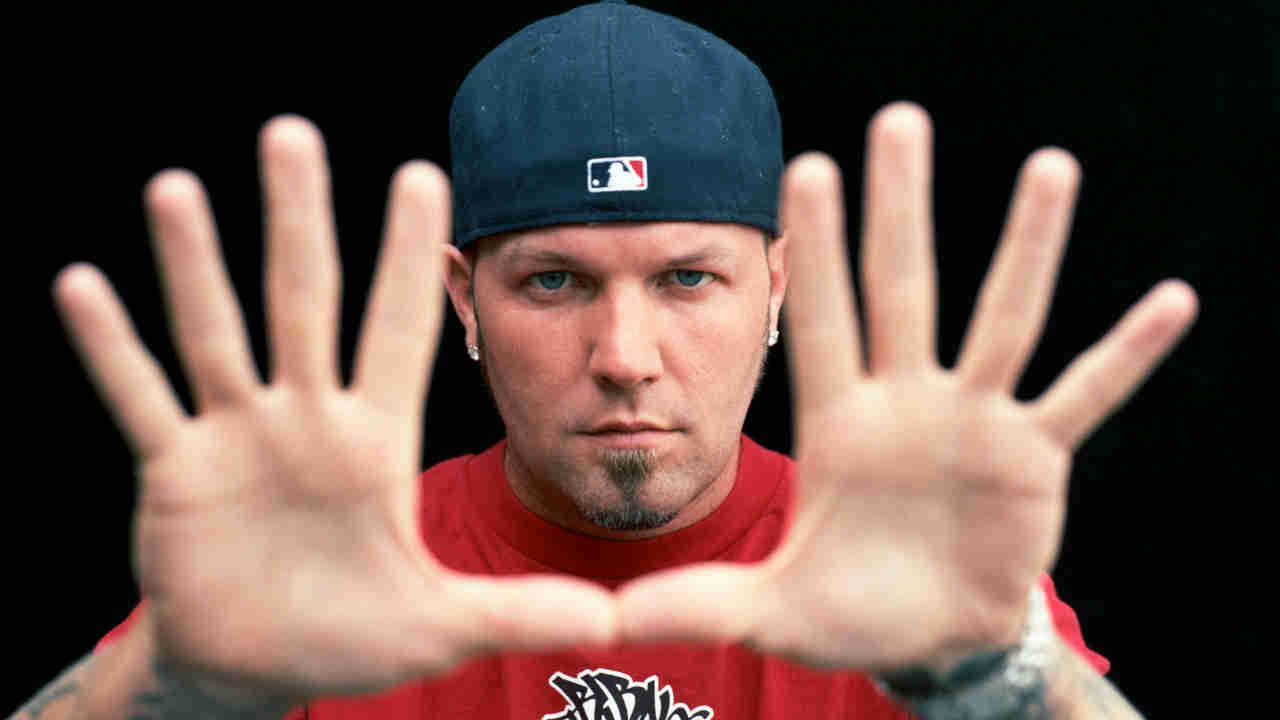
Few people have had such a rollercoaster career as Limp Bizkit frontman Fred Durst. One of the biggest stars of the nu metal era. he was equally loved and hated by fans. When the bubble burst in the early 2000s, it seemed like it was over for the man in the red baseball cap – but the last 10 years have seen an astonishing resurrection for Fred and his band. In 2013, just as the Durstnaissance was getting underway, he sat down with Metal Hammer for one of his most candid interviews ever.
What is Fred Durst actually like? Take a second to think about it. You might think he’s the goofy, laugh-a‑minute clown prince he portrays in his videos. You might think he’s the unruly troublemaker he comes across as on stage, causing chaos wherever he goes and always bringing the motherfucking ruckus. The reality is something far more sobering and out of left-field. Hammer spent some time getting to know nu metal’s most recognisable figure in order to get the full Limp Bizkit story from his perspective. From Britney to Woodstock, from the gutter to being one of the biggest stars in rock history, this is Fred Durst’s nu metal journey.

What did you think when you first heard Korn?
Fred Durst: “It was really dark in a cool kind of way but that was down to Jonathan [Davis]. It was something I related to and had been waiting for. I thought, “Where have these guys been my whole life?’”
Did hearing Korn make you want to succeed in a band from that moment?
“We were already Limp Bizkit at that point. I was in several bands before that, rapping over old Metallica-style riffs and Vulgar Display Of Power shit, but Korn influenced us. Them, Rage Against The Machine, Urban Dance Squad… there were a few bands mixing it and Korn brought the heavier element that I’d been missing and we were doing, and we could relate to them. Jonathan wasn’t rapping but it came from the same place as me because he’d been bullied and that was something I could feel and relate to.”
Do you remember the first night you met them and you tattooed Head?
Sign up below to get the latest from Metal Hammer, plus exclusive special offers, direct to your inbox!
“Perfectly. Korn played with Sick Of It All and they were on really early and just ripped it up. There must have been about 40 people there but after the show they just came out in the crowd and were hanging out drinking beers. I offered them a tattoo and gave them my demo tape, and 16 beers later, we’re at my house all fucking wasted. It was me, Reggie [Fieldy] and Brian [Head], and I gave Brian a tattoo and our friendship started from there. I followed them around in my car the next time they came to town. I gave Fieldy another demo tape, he gave it to Ross Robinson and he liked it so we worked with him from there.
When you gave Fieldy your demo tape, did you expect anything to come of it?
“Not especially, but when we got in the studio and worked with Ross, you could feel it. There was a moment in the studio where things weren’t quite coming together and we just pulled our shit together and came out with the record that you have today. It was a good time recording our first record [Three Dollar Bill, Y’all].”
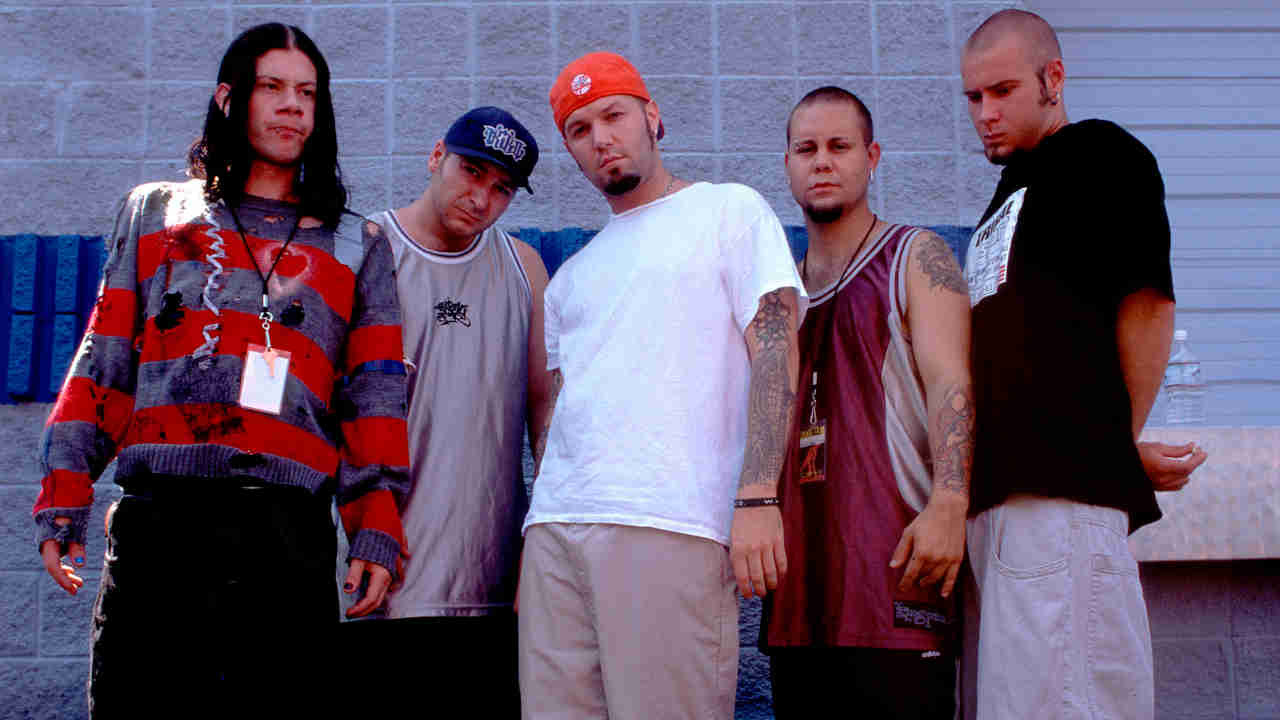
Did you and all of the bands breaking at that time feel a connection with each other?
“I did. I always looked up to the Deftones and Korn like they were our bigger brothers. It felt like we were changing things and people that didn’t understand what we were doing were pulling us closer together… to me at least. Nu metal was a ‘love it or hate it’ thing but I had a lot of respect for all of the bands doing it at that time.”
It always felt like Bizkit’s place in nu metal was that they brought a sense of fun.
“There was always a lot of pain in my life. Mental and physical abuse happens regularly in my life. I’ve been bullied my whole life but I also love having fun and getting crazy and being silly and outrageous. We always had that in our band and a lot of people didn’t understand that.
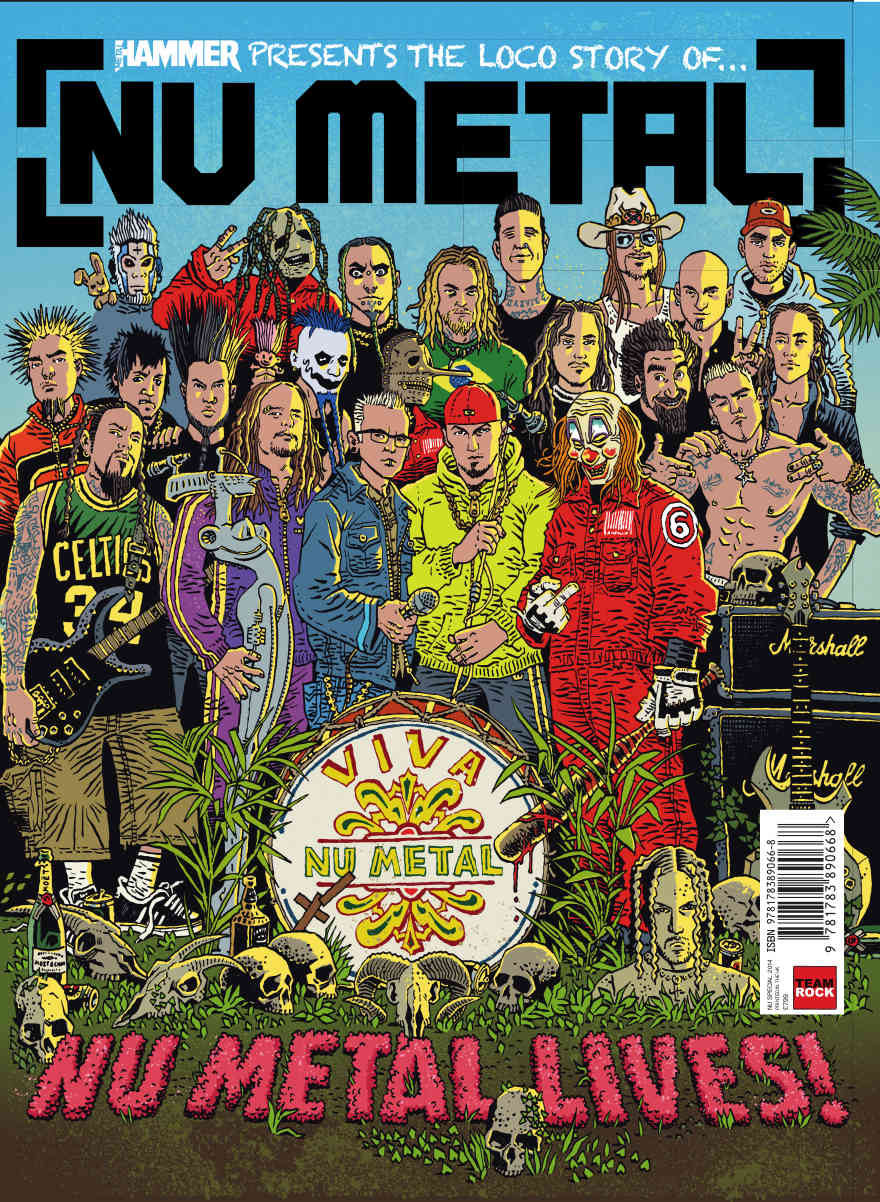
“A lot of our songs are ferocious and original and it was a reaction to a life of being bullied. It was also a celebration of fun sometimes, and a lot of the metal world didn’t understand that. A lot of the metal world would be thinking, “What is going on with that band and what the fuck is with that singer? What the fuck is he doing?” I didn’t know either! I created that monster. I’m Doctor Frankenstein.
“I created this thing and people wanted to interview me and put me on television and the label were calling and telling us we had hit songs on radio. They’d say, ‘You wanted to be a film-maker. Go direct a video!’ and I was just like, ‘What?!’ And it keeps going.
“At some point you have to think, ‘I can’t do this all the time. I can’t be this guy all the time. This is just a creature I created. How do I feed this thing all the time? It’s not who I am 24/7.’ But when I became that Tyler Durden guy, there were just no rules. It was like shooting up. The needle’s in, I’m fucking going… not literally, because I’ve never touched drugs. It was crazy. Everywhere I go, I’m there in person, but I was carrying around this giant person behind me on a chain.”
Did it feel like people only wanted to write about the ‘Tyler Durden’ side of Fred Durst?
“Absolutely, man. When you’re in that moment and you’re a simple person from a simple background and you’re thinking, “How did I become a rock star? Why do people care what I do?” it’s a wild thing. The more they focused on me, the more they fed that beast. I can’t kill the beast, I can’t get away from it and that persona ate me up. I was homeless and I was tortured before being in this band so I’m not complaining because I know what the bottom tastes like, but I was not a happy boy.”
It must have been a whole lot worse when the mainstream tabloids wanted to suck the blood out of you when you were associated with the Britneys and Christinas of the world.
“I didn’t know how to deal with it. Wherever you went, it felt like eyes were on you and like your life isn’t your own any more. I hung out in Hollywood but I never cared who was cool and who wasn’t. I didn’t think, ‘I’ll talk to you because that will make me cool.’ I just hung out in those places because it was easier to hide there. I was just relating to other people who were in a similar situation and then you meet a girl and everybody starts flipping out. You sort of think, ‘Fuck all these people.’ If people had to find out every last detail of your life and what you jerk off to at night, people might hate you too. It’s none of anyone’s business.
“I didn’t know how to feel apart from disappointed. I was young and wanted to have fun and I had to not let the outside world bend me into the paper clip that they wanted me to be.”
Was it crazy to go from nothing to having everything in the palm of your hand? Did it make you go for it more because it was like your wildest dreams came true?
“I didn’t say no. I said yes to everything. I was just a kid from a farm in North Carolina and I wondered how I was sitting in Hugh Hefner’s office. I never said no to anything but drugs. Everything else, I said yes. No girls ever liked me and so when the girls started coming, even though it was superficial, I said yes. I said, ‘Bring it on!’ I couldn’t believe that all of these girls would sleep with me and not care about how boring I am. It was just yes, yes, yes to everything but drugs.”
Was it a bummer when the bands you’d grown up with were all turning on you? It felt like when Bizkit blew up on Significant Other, the bands you’d come up with were quick to take pot shots.
“I’ve been bullied my whole life so it wasn’t different for me. I never retaliated. I couldn’t. I had nothing to defend. I’m just a guy living this crazy life and I just wondered why everyone cared about my life so much when they had great lives of their own they could have been living. It bummed me out and if I think about it, it still bums me out. Every now and then, I’ll see a guy and he’ll just come up to me and say, ‘I thought all of your shit sucked apart from Three Dollar Bill. Can I have a picture with you and can you talk to my sister on the phone?’ Dudes are fucking crazy. It happens more than you’d ever imagine. I’ll just be walking with my kids and someone will come up and say, ‘Did you really fuck Britney Spears?’ Every other day, someone will say, ‘Where’s your red cap at?’ Even to this day that shit happens. It’s weird, man.”
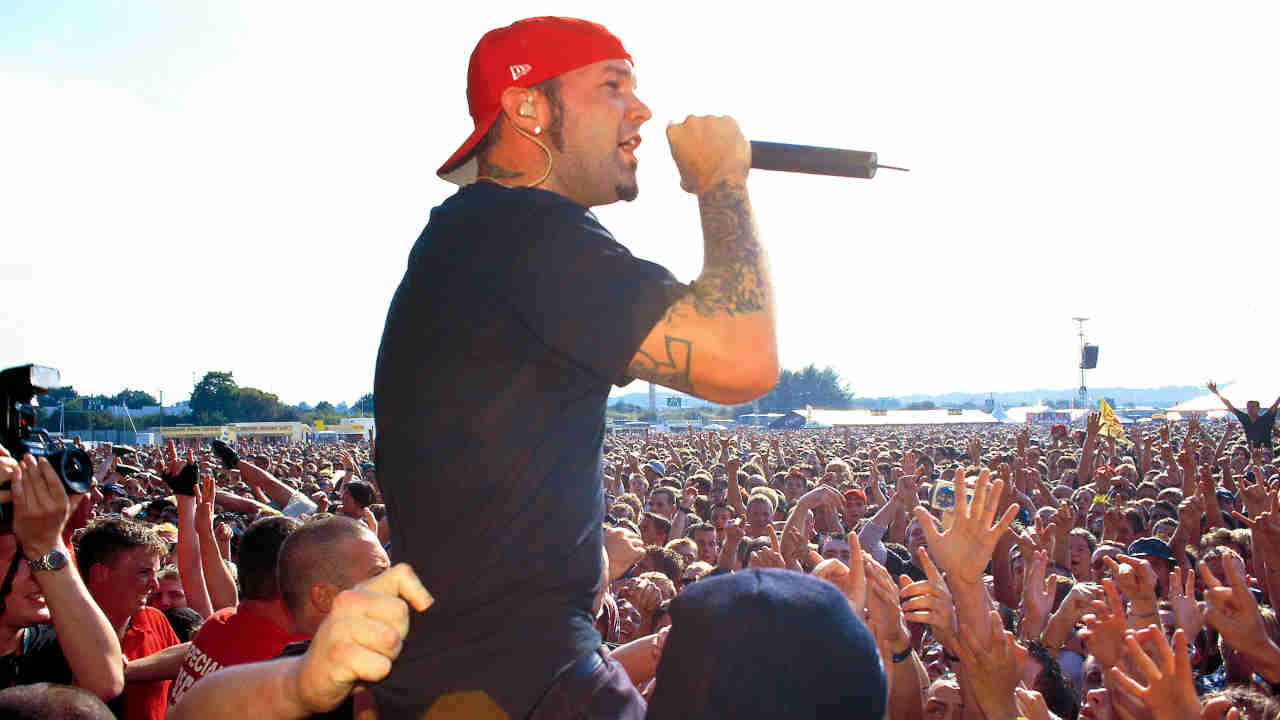
Did you ever think the red baseball cap would become such an iconic thing? It was as recognisable as Superman’s outfit. People will always think of you when they see someone flipping a red baseball cap backwards.
“No way. You never want to think that you’re going to have a clown costume that everyone’s always going to want to see you in but that’s what it was. I got a red cap back in the day, it was my good luck hat and I just wore it. The next thing I knew, I saw tonnes of people wearing the hat and you don’t have control of who wears it. I would see bullies who were misinterpreting the whole thing. I would see them from the stage in their red caps, beating up other people just there to have a good time and they were dressed like me! That killed me. I took it so personally. I’ve been trying to shake off the responsibility I felt for that for years. I’m not responsible for how people act but I felt that way and it cut me so deep.”
Did it make the Woodstock riots that little bit harder to take? It felt like people were misinterpreting what Bizkit were about on a grand scale.
“For us, we turned up and expected people to know what we’re about. We’re about having fun and when I say, ‘Break your fucking face tonight,’ I don’t mean it literally. It was a song for people to stand up for themselves against bullies and bad people. If I had known to make that clear, I’d have done that from the very beginning, but I didn’t.
“The whole thing exploded after we did what we normally do at every one of our concerts – bring fun. They built the whole thing around nu metal and 300,000 strangers from different backgrounds got together and to us, it was this awesome thing and everyone loved it. We get offstage and they removed us from the premises and we were just going, ‘Why?’ They tell me the plywood I was surfing on had been ripped off buildings and I’d incited a riot. We couldn’t fucking believe it. We really didn’t know, dude.”
You must have been crushed to discover the riot broke out during your set.
“I couldn’t believe it. I just wanted to go back out there and I wanted to say something to tell them to calm down and they wouldn’t let me. They gave people peace candles the next day and they used them to burn the place down and they blamed that on us too. Kurt Loder [MTV presenter] was on TV talking shit about us and we couldn’t believe it. That picture of me on that plywood is going to haunt me forever.”
Did you personally feel like rock’s most hated figure, either at that time or at any point?
“I’ve tried not to focus on what anyone says about me. It hurt me for a long time because I would see and hear bad things and I couldn’t see it any more because it was so negative and that became really hurtful. I felt like I was a target. Public enemy number one. If you focus on that, it makes you spiral the wrong way and I’m already damaged enough. I’m just trying to be happy and grateful for all the things I have.
Even after Woodstock, Chocolate Starfish was a massive success. Did it feel like no matter what happened, people were still with you and Limp Bizkit?
“It felt like we just started to poke fun at what people thought we were and embrace that. That’s why we made the Rollin’ video. There were red caps everywhere and look at Wes at the beginning of the video with his grills in. How the hell did people not realise we weren’t being serious? We thought it was hilarious.”
How did the Rollin’ dance come to fruition?
“I figured it out with the dancers on the day! I needed a dance I could actually do so we came up with the cheesiest dance ever. Right, left, right, left, pull down. Simple!”
How did it all fall apart from there?
“It just got too big. The label milked us to death and we all started living success in our own ways. Wes realised that he was an eclectic artist – Limp Bizkit got too huge and he’s always been more indie. He left and we sort of looked at each other wondering what happened. After a few years we got together again and realised we both had a void, and we missed the humour in the band and we’re actually friends who hang out now. It was never like that back then. We’re all so grateful for each other, I can’t even tell you.”
Is it fair to say it was never really the same without Wes in the band?
“I don’t want to disrespect anybody but Wes is a genius. You’re always going to miss someone with his gift and talent.”
Being in Limp Bizkit in 2003 must have been like being in Def Leppard in 1992 after the grunge movement. Limp Bizkit didn’t change but the world around you had.
“And I still rock out when Def Leppard come on too! It was nice to get a bit of my life back without feeling like everyone wanted to know how my shit smelled that day. It was a time for personal evolution. I’m happy because it allowed me to get my life into a better place.”
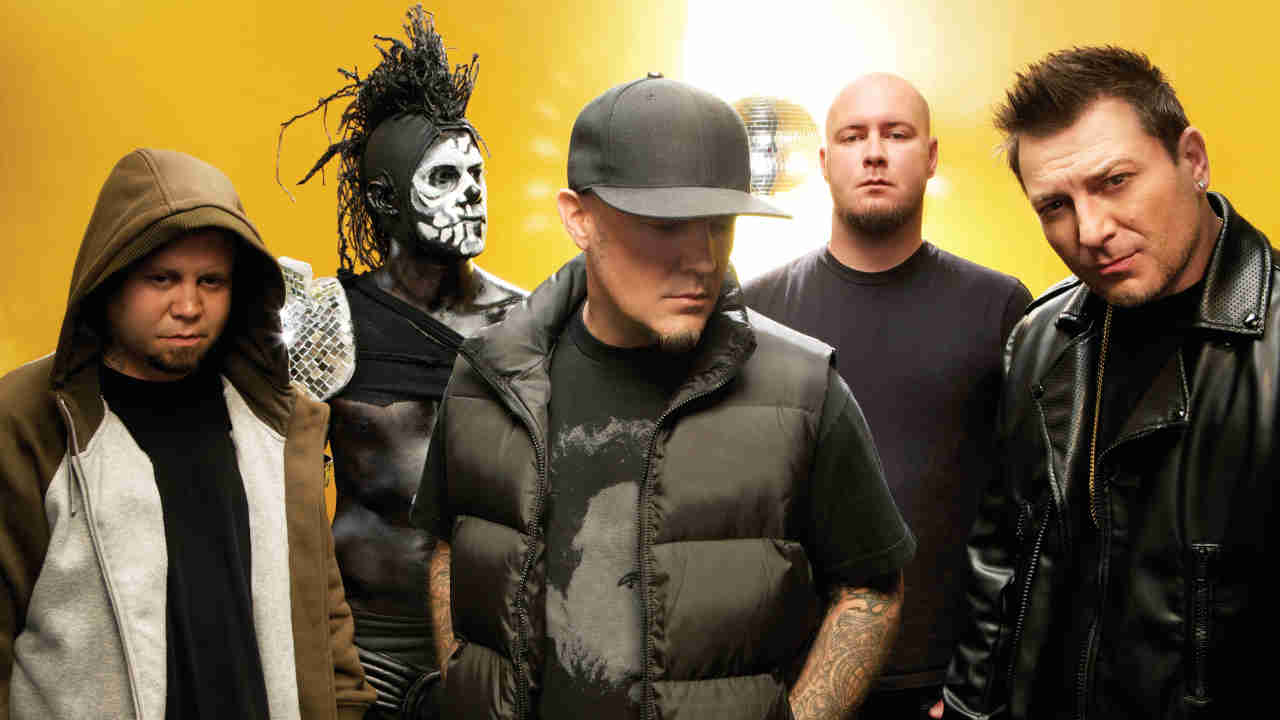
How do you look back at the band’s nu metal years these days?
“Nu metal was left of centre, man. Nu metal was that moment in life when the walls were breaking down between genres and the emotions were high about that. People were either high on the emotion of things being fresh and exciting in terms of new sounds and urban music coming into heavy music in a big way, or they were rebelling against that. People who liked different kinds of music got what they wanted for the first time. It was that one moment in time when the planets lined up and we all got to share that moment together. That moment meant something to a big group of people who had never been heard before. That’s what it was. People were searching for a new outlet and maybe that will come around again. It was a special moment.
“It was the moment like The Beatles and rock’n’roll and Led Zeppelin happened, and they were all new waves that spoke to people who hadn’t been heard before. All of these bands shared their pain with people who felt the same way. Nu metal let people open up and it meant something to people. It really did.”
Can nu metal have a revival?
“I think so. It’s like a volcano. It’s always there and it’s gonna erupt once in a while. It’ll be done in a new way but the essence of nu metal is always gonna be there. I want to hear it myself.”
Is it weird for Limp Bizkit to be considered a classic band in 2014?
“I appreciate that. If people are saying that, I’m grateful for that feeling to be out in the world. When you’re in the middle of a war, sometimes it’s hard to see what you’re fighting for. If, when the dust settles, people can look back and realise we were about bringing fun and our intentions were good and we were cool dudes who got lucky and we did it our way, that’d be awesome. We didn’t do it as gracefully as others, or as ungracefully as some, and we’re still standing. For better or for worse, we have always just been Limp Bizkit. That’s all we’ll ever be.”
Originally published in Metal Hammer Presents Nu Metal, January 2014


